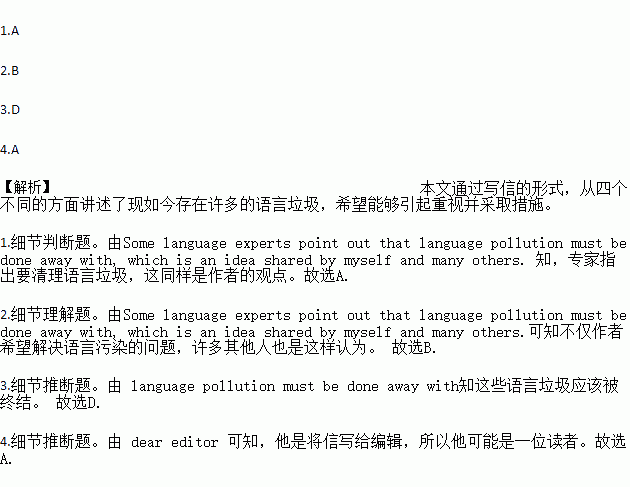题目内容
Dear editor,
You can find language pollution whenever you open a newspaper or turn on your TV set, listen to a popular song at various advertisements. Language pollution exists almost everywhere and can be seen in the following places:
.1. Chinese characters are written in the complex (复杂的 ) form. Although simplified(简化的) Chinese characters were accepted for use many years ago, it seems that more and more people like Chinese characters written in the complex form.
.2. Many goods are produced in China but carry foreign names, which sound strange and have no meaning at all.
.3. Words and expressions being used have a bad meaning. "Ba"(霸), which means bully in Chinese, is one example. Now there are a lot of goods, restaurants, even factories or firms, with "Ba" in their names.
.4. There are too many incorrect grammatical expressions. Some films have strange names and incorrect grammatical structures. "Ai ni mei shang liang', which means "I love you without consulting", is grammatically incorrect and this kind of expression is now becoming popular.
Some language experts point out that language pollution must be done away with, which is an idea shared by myself and many others.
Fan Yongqian
1.The writer of the letter suggests that ______.
A. something be done to make our language pure (纯正)
B. the Chinese language not have the word "ba"
C. everything have a good name and a good meaning
D. everybody try their best to stop pollution
2.What the writer wants to say is that ____.
A. great difference exists between the Chinese characters written in the complex form and simplified form
B. many people agree with the experts on language pollution in China
C. our newspapers, TV programs, pop songs and advertisements are getting polluted
D. some film writers haven't studied Chinese grammar
3.The expression "do away with" in the last paragraph means "_______".
A. clean B. recycle
C. get away D. end
4.What do you guess Fan Yongqian is? He or she probably is _____.
A. a reader B. a singer of pop songs
C. a language expert D. an expert of grammar
| A. | blindly | B. | unwillingly | C. | closely | D. | carefully |
| A. | To absorb | B. | To be absorbed | C. | Absorbed | D. | Absorbing |


 ificent Keukenhof Gardens — home to 800 varieties of tulips(郁金香).The Telegraph’s gardening expert will talk about the best new varieties and the garden’s history.
ificent Keukenhof Gardens — home to 800 varieties of tulips(郁金香).The Telegraph’s gardening expert will talk about the best new varieties and the garden’s history.